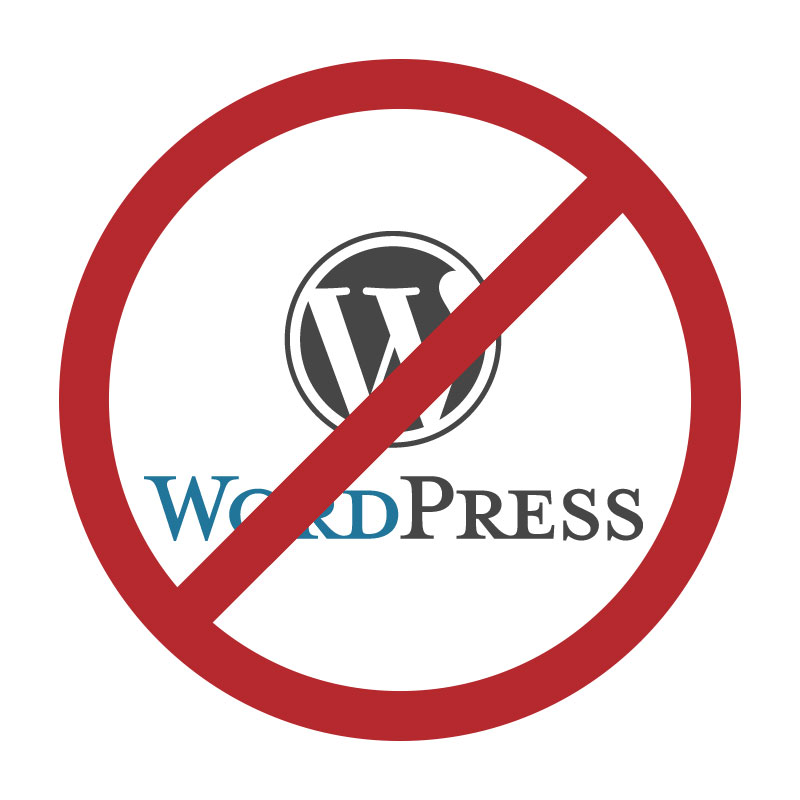A Case to Go Custom

(And Not Use WordPress)
WordPress is the world’s most popular content management system. It is free, easy to install, and if you know what you are doing, you can get a site up rather quickly. However, it is not without its problems…
The Problems with WordPress
Low SpeedWordPress is notoriously slow. WordPress performance relies on so many factors, that it can often feel like herding cats. Performance can be affected by server setup, theme coding, plugins, template setup, external scripts – basically anything that WordPress uses, makes it slower. Monitoring these pieces and adjusting them as necessary takes time (and money). |
|
Security IssuesBeing popular makes you a target, and WordPress is the world’s most widely used Content Management System. As such, it is the bullseye of hackers, worldwide. Furthermore, it is open source, which means the code is readily available for hackers to view to exploit its vulnerabilities. So, it is not a matter of “if you get hacked” but “when”. But the problem with WordPress’s security is not just the platform itself, it is all the additional templates, plugins and widgets that come along with it. Every add-on adds a new vulnerability. Which leads us to… |
|
MaintenanceBecause of the performance issues and security vulnerabilities, WordPress requires continual maintenance and upkeep. However, not every WordPress update is compatible with every add-on you have added to your site. The problem can become exponential as code incompatibilities surface between plugins, themes, and the core WP code. Staging sites, continual backups and rigorous testing are part of your weekly maintenance routines – which can be extremely time consuming. (i.e. Expensive) |
|
Lack of FlexibilityWordPress was developed as a blogging tool. But since its inception, developers continually force it to be a Content Management System. It is a classic Square Peg vs Round Hole scenario. Does it work as a CMS? Absolutely. However, depending on your application, you can become quite frustrated trying to get WordPress to “do what you want it to do.” Most fall short of their intended function and developers surrender to the idea that they must clip the corners off their pegs to make them fit the “solution” they have chosen. |
|
Higher CostWordPress is FREE! That is awesome. And it is super easy to install! Even Better. However, due to all the criteria listed above, the final cost of that “freedom” ends up costing you. A Lot. Added development costs, added maintenance costs, added monitoring – it adds up. |
The Advantages of a Custom Website CMS
If your needs exceed the functionality of existing software, you should consider customization.
FasterSince a custom CMS is designed to do exactly what you need it to, there are no extra bells and whistles to slow it down. The code is optimized to serve your unique needs, thus increasing the site speed. |
|
More SecureA Custom CMS is more secure because the framework is unique and therefore has fewer security holes. This makes the website much more difficult for hackers to exploit because they are unfamiliar with the system. |
|
Better SupportCommitting to a custom CMS usually means you will have in-house support from developers who understand what your business needs, so problems are generally solved within hours. |
|
Highly CustomizableIf you can dream it, someone can build it. Your custom CMS can provide practically any tools you want. |
|
FlexibilityWith WordPress, most designers are limited to templates. (Or start with templates to keep the cost down.) While templates are quick to install, your competition might be using templates as well. When you cannot stand out as a business, your website gets lost among the millions of other sites. Furthermore, templates are not always as flexible as you require and you end up having to develop content to the template, rather than designing your site around your content. Additionally, third party implementations are easier with a custom CMS, since the site can be built around the needs of the tool. |
|
Ease of Use:The users only see what they need to see to do their jobs. Meaning you can spend less time training and more time using your new customized solution. |
Big Fat Designs' Solution:

